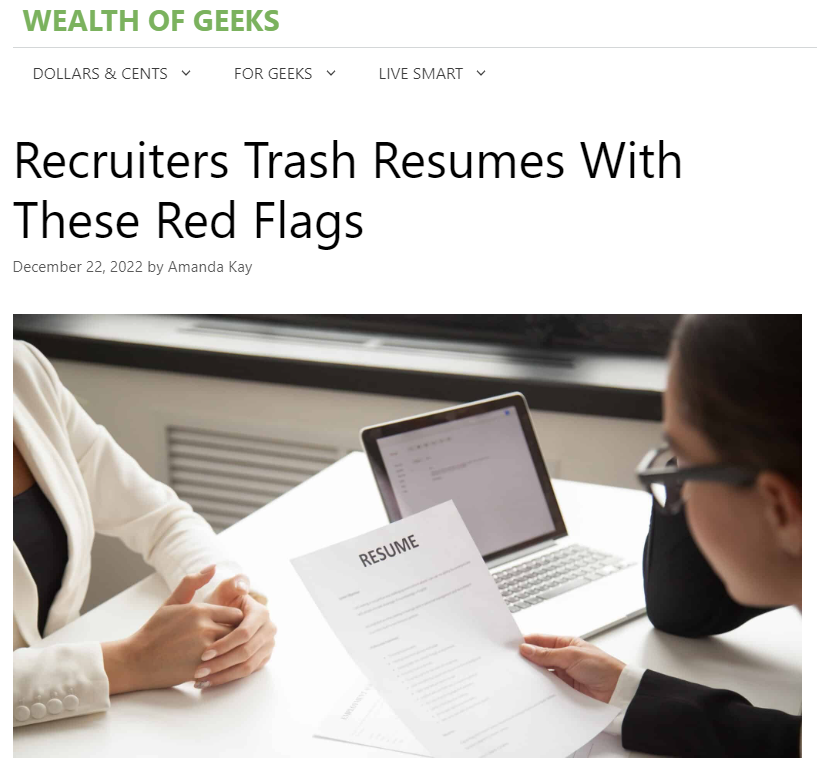Your resume only has about 10 seconds to stand out from the other hundreds of applicants. If successful, it only has a 2% chance of getting you an interview. Avoid these red flags on your resume:
This article was written by the experts at Wealth Geek with professional insights by Crawford Thomas Recruiting President, William Stonehouse III. Original Article here
With the vast amount of resumes that recruiters have to sift through, they don’t have the time to give each one the attention it deserves. Employers are looking for any excuse to weed out resumes and get the stack down to a manageable size. You won’t pass the first step of the hiring process if they immediately spot any red flags.
So, how can you ensure that your resume stands out from the rest and grabs the attention of the person reading it? Experts at CV Maker have revealed the top 5 resume red flags you should avoid when looking for a new job.

1. Typos and Grammatical Errors
Mistakes like typos and grammatical errors are the first red flag that employers notice. It shows that you don’t pay attention to detail or care about your work. Employers may think that you won’t do your job properly if you can’t even take the time to proofread your resume.
“They make an applicant appear sloppy and careless,” says Kimberley Tyler-Smith of Resume Worded. “I don’t expect perfection, but I expect people to care enough about their professional brand to make sure every word is spelled correctly and formatted correctly.”
Small mistakes are generally forgivable, but a resume full of errors sends the wrong message. Always use a spellchecker and get at least two people to proofread your resume and cover letter before applying.
If you notice multiple typos or major mistakes after you’ve submitted your resume, consider resending it. It may feel awkward, but it’s the best way to ensure that the employer sees your qualifications, not your mistakes.
2. Unprofessional Email Address
When reviewing your resume, your email address is one of the first things a recruiter or hiring manager will see.
If you want to be one of the 6-10 candidates interviewed for the job, don’t use that cute or funny email address you created years ago as a teenager. It comes across as unprofessional and gives employers a reason to reject your application.
Create a free email address using your name or a variation of it. It’s an easy way to make a positive and professional first impression and helps to keep your job search organized.
3. Employment Gaps
Having one gap in employment on your resume is common. The pandemic forced many job seekers to take a break from their careers. Starting a family, traveling, or returning to school are also valid reasons for gaps.
“Increasingly, hiring managers are open to hearing a candidate’s story regarding their work history and education. If you have the exact skills they are looking for, gaps in employment are not a deal breaker,” says William C. Stonehouse III, President, Co-Founder of Crawford Thomas Recruiting.

William Crawford Stonehouse III of Crawford Thomas Recruiting.
However, multiple and large gaps are big red flags that recruiters will notice immediately. They imply that you are unreliable, not good at time management, or simply not interested in working. Employers will fear you will also quit this job when faced with pressure or challenges.
Don’t put any doubt in their mind. If your resume has multiple gaps, include a brief but honest explanation in your cover letter. Tell them what you did while you were unemployed.
“I want to see an explanation,” says Stacey Mallory of Altis Recruitment. “I always coach candidates to not leave anything unanswered in their resume.”
If you can, spin the gap in a positive light. For example, if you took time off to raise your children, you can talk about how that experience has made you more patient and a better communicator.
Whatever you do, don’t try to hide your employment gap. Potential employers will likely find out about it eventually, which will only make you look dishonest.
4. Job Hopping
With the rise of the gig economy and the decline of traditional 9-5 employment, more people are finding themselves job hopping. There are all kinds of reasons people look for a new job, such as higher pay, better benefits, and flexible schedules.
“Millennials and Gen Z are switching jobs more often than not,” adds Stonehouse. “For better or for worse, this may be the new normal.”

Be careful, though. Frequent job-hopping on your resume is a red flag for employers. They see this as a sign that you lack commitment or are always looking for something better.
There’s nothing wrong with taking advantage of new opportunities, but consider how they look. Employers don’t want to invest in someone who frequently changes jobs without justification.
“Managers understand that people have to leave if the company can’t offer an employee the growth opportunities they need to continue developing and moving forward in their career,” says Mallory. “Whether it’s for professional growth, to change industries, or if it’s a contract role, I don’t see job hopping as a red flag as long as it’s explainable.”
Whatever your reason, be honest and focus on how job-hopping has helped you grow and become a better employee.

5. Too Much Personal Information
It’s smart to show a little personality on your resume, but too much personal information is a big red flag.
You only have a few seconds to show employers you can do the job. Don’t waste them by including details that aren’t relevant.
Highlight your experience, skills, and accomplishments, but don’t tell your life story. Employers don’t want to read about how you like to go camping or that you won a tennis tournament in high school. You will have the opportunity to let your personality shine through at the interview.
It is also illegal for employers to ask you about specific personal details, such as your marital status and religious beliefs, so don’t bother adding them.
Resumes aren’t always fun to prepare, but they are necessary if you want a successful career. It’s all about avoiding these red flags and making it easy for the reader to know exactly why they need to interview you for the job.
This article was produced by My Life, I Guess and syndicated by Wealth of Geeks.
About Crawford Thomas Recruiting:
Crawford Thomas is a team of leading HR recruiters. We not only fill staffing needs, we partner with organizations to find out how their recruiting needs tie into their business objectives. Through this, we are able to meet your staffing needs in a way that achieves organizational success.
Start securing top talent by visiting our page for employers today.

